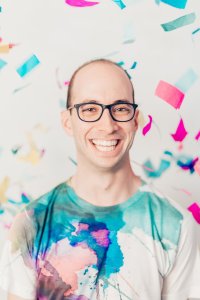A words-artist and musician by profession, Booth is the founder of the Speak Story Series, a community-based and organized concert series that brings recognized storytellers from across the world to listeners in Shepherdstown (WV). The series presents stories about diverse cultures and beliefs, helping people, as Booth describes, “bond over deep emotional experiences.”
Having worked as a traveling storyteller for twelve years, Booth knows the vocation is a curious one. His interest in storytelling began during his undergraduate years at Shepherd University, when he took a course in Appalachian culture. After writing a folklore report on the West Virginia Liars’ Contest (an annual “tall-tale” competition that draws well-known storytellers like Bil Lepp), Booth resolved to try a little storytelling himself.
“I grew up around a lot of storytelling, and the stories I researched [for the report] reminded me of what I’d heard growing up,” he explained. “So I decided to compete.”
The music major ended up winning third place—with a story he made up the weekend of the contest—and was immediately hooked. The next year, he went back and took first place. Booth continued competing over the years, placing seven times, with four first-place finishes.
Storytelling comes naturally to Booth, and he has built and sustained a successful career around it. He has performed his folklore tales at the International Storytelling Center, National Storytelling Festival, and the Banff Centre (Alberta) Spoken Word program, among countless others. With a background in music composition, Booth draws parallels between the two artistic mediums; he believes creating a story is “very much like writing a piece of music, and telling a story is like deciding what instruments are used and how they combine together to make something enjoyable.”
Though many people aren’t familiar with Booth’s line of work, seeing him tour the country to tell tales generated interest in Shepherdstown. After repeated requests for stories by local residents, Booth was eager to make it happen. In 2013, he and a group of friends began brainstorming about renting the Shepherdstown Community Club (SCC) for such a performance, and the idea quickly expanded to include other local storytellers.
“I can’t understate how crucial my friends, the SCC, and the town were in getting Speak started,” he emphasized. “It really is a community-based event.”
In the last year alone, Booth says Speak has seen monumental growth. A group of volunteers from the local community keeps the series running smoothly, and Speak recently developed a relationship with Shepherd University, offering a course under their Appalachian Studies program. The organizers have also moved the event to a larger venue, Reynolds Hall, on Shepherd’s campus.
It’s clear the series is grounded in community. Speak has partnered with numerous organizations over the years including the Day Care, the Caring Cupboard, and the Friends of the Shepherdstown Library. Many storytellers visit the local schools—their performances made financially accessible through partnership with Speak. Over the last four seasons, Speak has seen a growing audience of listeners as well.

“When tellers leave Shepherdstown, they often remark on how deeply our audience listens to their stories,” Booth said. “On the storytelling circuit, we are becoming known as a destination.”
Perhaps that captive audience is due to Booth’s persistence in bringing a variety of story traditions and storytellers to town, such as Daniel Morden, Dovi Thomason, and Oba William King. So far this season, the series has boasted storytellers from Brazil and Hungary, a Lakota hoop dancer, a master of African and Africa-America traditional stories (who also plays the kora), and a teller who shares stories from the Arabian Nights.
“We’ve brought folks to Shepherdstown who are different from us as a whole, and we’ve learned from them, experienced their traditions, and created a conversation,” Booth pointed out. “The latter is more important now than ever.”
Booth believes storytelling is a powerful tool to encourage empathy.
“Storytelling is common to all humans,” he stressed. “When we experience storytelling, we unite together with other listeners for a shared experience that is filled with learning and emotions. It is through story that we learn how to face difficult situations, even before we experience them in life.”
To that end, what’s next for Speak? Booth intends to improve upon the legacy of community-building that so distinguishes the series already.
“I would like to continue to grow our outreach,” he said, adding that he’s focused on developing stronger relationships with local schools and Shepherd students. His goal is to feature Speak storytellers-in-residence at the university or create a longer town residency.
“I’d love to be able to extend concerts and workshops to many more schools in the area, so that our youth are hearing diverse stories and learning from them,” he observed. “It would be great to have storytellers work with university students on things like communication and peace building, present story concerts, and maybe even create new work while they’re in town.”
Visit Adam’s website to learn more about his work and listen to his stories.
By Kristyn Lee